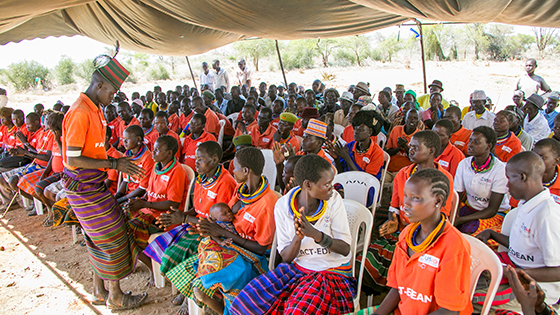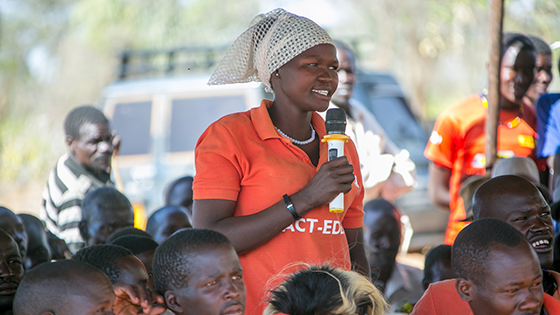In EDEAN, Youth Leaders Create a Space to Reflect on Fertility and Family Planning
Where I live in Uganda, people often think reproductive health is a “private” issue that should not be discussed openly in the community. Open, reflective dialogue can be difficult due to cultural, social and gender norms that have taught us not to speak of sensitive topics like menstruation out loud to others. In Karamoja region of Uganda, where less than 1 in 10 women are using a modern method of family planning, Fertility Awareness for Community Transformation (FACT) Project’s EDEAN intervention is using theatre performances to bring conversations about fertility and reproductive health to communities. I want to share what I’ve learned about our approach and the importance of engaging youth in the process.
“EDEAN” is a local acronym for “Let’s Come Together and Strengthen Child Spacing.” EDEAN is a community-based innovation that involves youth as change agents to foster an environment where young women and men can take actions to protect their reproductive health.
EDEAN uses a peer learning and community theater approach to spread fertility awareness messages to the entire community. Youth were selected and trained to serve as peer moderators. In this role, they led peer meetings and community theater performances on 4 topics: couple communication, menstruation, fertility, and family planning. In addition to scripted storylines, the peer groups had the opportunity to create dramas that were unique to their communities.

How did the performances catalyze community reflections?
In each community theater performance, a discussion is moderated after every scene and at the end of the performance. Peer moderators use guiding questions and reflection messaging to help the audience reflect on what had happened in the scene and how the information could apply to the local context. Some examples include:
- Why did Sarah [a character] decide to go to the hospital after consulting her friend on child spacing?
- Who should decide how many children to have, or should it be a joint decision?
- Is it important for couples to talk about when they will have children and how they will space them?
- Why do the three women have menstrual cycles that are different lengths?
In these question and answer sessions, we saw that youth were motivated to learn and participate actively. Most asked questions about fertility and family planning topics – especially about male and female organs, how conception occurs, and misconceptions about family planning. We observed that men were most interested in the menstruation discussion topic, whereas elders emphasized couple communication.

What we learned from the EDEAN experience
Youth can be change agents when given the opportunity.
Youth were the key actors for the performances and passed accurate fertility awareness messages to their communities. Because of their work, more community members were able to attend the performances, and attitudes about family planning changed positively. (Youth peer group members made almost 7,000 contacts with community members in 6 communities in a period of 6 months.) Youth were able to address myths and misconceptions about fertility and family planning such as that menstruating women are not supposed to milk cows or cross vegetable gardens. Giving peer group member the opportunity to create their own dramas provided participants a feeling of ownership of the performances and motivated their participation.
With the right approach, men can actively participate in fertility awareness and family planning discussions.
EDEAN adapted to local gender norms by using a gender synchronized approach to the peer group meetings. Holding single-sex meetings helped participants reflect on sensitive topics and gain confidence before coming together for mixed sex meetings and rehearsing dramas.
Involving the youth from the local community drew men to participate, as did having male participants mobilize other men. “I heard about the performance from people within the manyatta [homestead] I am from,” said one 25 year old male audience member. “It had good information for people of my age, especially on how to talk to our wives.”
Youth who are non-health workers are able to deliver accurate information on fertility and family planning.
After training, youth are capable of delivering correct messages on fertility awareness and family planning, and can effectively break family planning myths. Youth who participated in EDEAN were low literate, with a majority being ABEK (Alternative Basic Education for Karamoja) and primary school dropouts. By observing youth as they conducted their activities, we found out that the youth followed the manual, maintained fidelity, and correctly used job aids for delivering fertility awareness information. They were creative and used locally available materials during the theatre performances. Mentorship and supervision were key to improving their confidence and accuracy over the course of the activities.
Stay tuned for the final evaluation results from EDEAN and the FACT Project! In the meantime, you can read the brief and watch a microdocumentary to learn more about the intervention.
 Where We Work
Where We Work  Press Room
Press Room  FACT Project
FACT Project  Passages Project
Passages Project  Learning Collaborative
Learning Collaborative  Search All Resources
Search All Resources  Social Norms
Social Norms  Fertility Awareness Methods
Fertility Awareness Methods